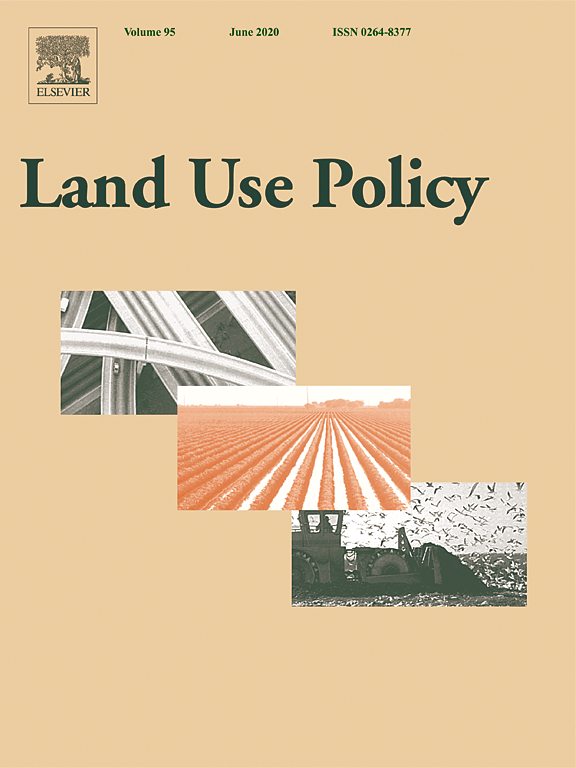Location
Land Use Policy is an international and interdisciplinary journal concerned with the social, economic, political, legal, physical and planning aspects of urban and rural land use. It provides a forum for the exchange of ideas and information from the diverse range of disciplines and interest groups which must be combined to formulate effective land use policies. The journal examines issues in geography, agriculture, forestry, irrigation, environmental conservation, housing, urban development and transport in both developed and developing countries through major refereed articles and shorter viewpoint pieces.
Land Use Policy aims to provide policy guidance to governments and planners and it is also a valuable teaching resource.
ISSN: 0264-8377
Members:
Resources
Displaying 221 - 225 of 279Farmer participation in agri-environmental schemes: Regionalisation and the role of bridging social capital
European agri-environmental schemes are being criticised for reinforcing rather than negating an opposition between agricultural production and environmental production, and for assuming instead of securing a public willingness to pay for agri-environmental change. This paper explores if a regionalisation of agri-environmental governance may contribute to overcome these criticisms. The paper empirically explores three regionalised agri-environmental schemes from Flanders, Belgium, with the use of 40 qualitative interviews with farmers and other relevant stakeholders.
Drought tolerant species dominate as rainfall and tree cover returns in the West African Sahel
After the severe droughts in the 1970s and 1980s, and subsequent debates about desertification, analyses of satellite images reveal that the West African Sahel has become greener again. In this paper we report a study on changes in tree cover and tree species composition in three village landscapes in northern Burkina Faso, based on a combination of methods: tree density change detection using aerial photos and satellite images, a tree species inventory including size class distribution analysis, and interviews with local farmers about woody vegetation changes.
A causal analysis framework for land-use change and the potential role of bioenergy policy
We propose a causal analysis framework to increase understanding of land-use change (LUC) and the reliability of LUC models. This health-sciences-inspired framework can be applied to determine probable causes of LUC in the context of bioenergy. Calculations of net greenhouse gas (GHG) emissions for LUC associated with biofuel production are critical in determining whether a fuel qualifies as a biofuel or advanced biofuel category under regional (EU), national (US, UK), and state (California) regulations.
Questioning the use of ‘degradation’ in climate mitigation: A case study of a forest carbon CDM project in Uganda
An urgent need to stop degradation is frequently cited as support for climate mitigation efforts involving forests. However, lessons learnt from social science research on degradation narratives are not taken into consideration. This creates a risk of problematic degradation narratives being used to legitimise forest carbon projects. This study examined a Clean Development Mechanism (CDM) forest plantation in Uganda, where incomplete and partly contradictory evidence on land use change was interpreted in a way that overemphasised degradation.
Attitudes of a farming community towards urban growth and rural fragmentation—An Auckland case study
As the global population continues to increase, rural areas are expected to accommodate future growth at the same time as continuing to feed growing populations. This tension is greatest on those who farm land that is earmarked for future urban growth. Yet, little is known about the attitudes and values of the affected rural farming communities or farmers’ perceptions of the challenges and opportunities that population growth presents.



